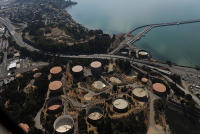Contra Costa County stands to lose millions in tax revenue from refineries
By Lisa Vorderbrueggen
Contra Costa Times
Posted: 02/15/2012 05:44:55 PM PST
Updated: 02/16/2012 06:35:19 AM PST
Click photo to enlarge

Interstate 580 snakes around the Richmond Chevron Refinery in this aerial view on Oct. 14, 2010,...
Contra Costa County, home to the highest concentration of oil refineries in the state, is sweating after a recent court ruling that could cost local agencies millions of dollars in property tax revenues from petroleum producers.
A Southern California appeals court in January tossed out a 5-year-old state regulation -- dubbed Rule 474 -- that determined how to set the taxable value of oil refineries. The rule limited the extent to which the declining value of aging equipment could reduce a refinery's overall tax bill.
Dumping the rule favors the state's 13 oil refineries and Chevron, the county's biggest taxpayer, most of all.
Contra Costa estimates the shift could retroactively drop the taxable value of the Richmond refinery by as much as $200 million a year for each of the past five years.
It could trigger a $13 million tax refund that would be borne by cities, fire, park and other districts. It also could lower by several million dollars Chevron's future tax payments.
The county's other three refineries have changed hands in recent years so there would not be a large retroactive drop in their taxes, but they could pay less in the future.
The crux of the issue is whether assessors can value a refinery's land, buildings and equipment as a single unit, rather than separately. A split assessment, which the court ruling mandates, favors oil refineries because the value of machinery and other equipment depreciates over time.
That, in turn, lowers a refinery's overall taxable value.
"Refineries are not sold separately as land and equipment. They are sold together," said Contra Costa Supervisor John Gioia of Richmond. "This loophole flies in the face of what happens in the real world."
Contra Costa's four refineries were worth a combined $6.3 billion last fiscal year and paid $77 million in property taxes. That represents about 4.5 percent of the county's $136 billion in total assessed value.
The biggest financial blow will land on Richmond, which receives the majority of Chevron's property tax dollars. This fiscal year, money from the oil giant made up about 13 percent of the city's $121 million budget.
The county Board of Supervisors voted last week to join the state Board of Equalization if it takes to the state Supreme Court an appeal of the court ruling that upheld a 2007 lawsuit brought by the Western States Petroleum Association. The state board has until Feb. 28 to make a decision.
The industry filed the lawsuit after the state changed the appraisal formula.
Counties want to retain the assessment method, saying that refineries were unfairly manipulating the rules in order to drive down their assessed values.
"Machinery and equipment cannot contribute income without the land and conversely, land cannot produce income without the attached machinery and equipment," wrote Contra Costa County Counsel Sharon Anderson in a memo to county supervisors about the case.
The industry disagrees. Its lawyers said the formula illegally singled out refineries for disparate treatment under the tax law.
"It's a question of fairness," said Nicholas Ortiz, the association's manager of property tax issues. "We have opposed this rule since its inception."
According to county Assessor Gus Kramer, the court's decision will have no retroactive impact on the values of Shell in Martinez, Tesoro in Avon and ConocoPhillips in Rodeo.
The reasons are complex but put simply, all property owners pay taxes based on the lower of two numbers: Fair market value or the "Proposition 13" value.
Fair market value is an estimate of what a business or residence would sell for on the open market.
The value under Prop. 13, the landmark 1978 statewide initiative that capped growth in property taxes, is the most recent sale price plus improvements plus annual increases of up to 2 percent.
Chevron has owned the Richmond refinery since 1902 and has made hundreds of millions of dollars of improvements that add to its value. But its fair market value, which factors depreciation, is lower than its Prop. 13 calculation. The other three refineries have recently changed hands, and their Prop. 13 values remain below their fair market values. For that reason, the depreciation issue will not immediately affect their assessed values.
Chevron is already appealing its taxable value for years 2007 through 2011 and is suing the county in Superior Court for years 2004-2006.
If the oil company were to win every dollar it seeks in the appeals and lawsuit, the county and its cities and special districts that shared in the proceeds of property tax revenues would owe Chevron a tax refund of more than $104 million.
Contact Lisa Vorderbrueggen at 925-945-4773, www.ibabuzz.com/politics or Twitter.com/lvorderbrueggen.
What's at stake
$2.7 billion
2011 taxable value of Chevron's Richmond
refinery; decision could reduce that amount by
$200 million for each of the last 5 fiscal years
$194.7 million
Total property taxes paid by Chevron, from
fiscal year 2007 through fiscal 2011
$13.3 million
Possible refund owed to Chevron after an appeals court ruling to dismiss Rule 474.
